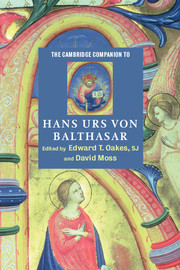Book contents
- Frontmatter
- 1 Introduction
- Part I Theological topics
- 2 Revelation
- 3 Christology
- 4 Balthasar and the Trinity
- 5 For the life of the world: Hans Urs von Balthasar on the Church as Eucharist
- 6 Balthasar and the figure of Mary
- 7 The saints
- 8 One sex or two? Balthasar’s theology of the sexes
- 9 Eschatology
- Part II The trilogy
- Part III Disciplines
- Part IV Contemporary encounters
- Select bibliography
- Index
4 - Balthasar and the Trinity
from Part I - Theological topics
Published online by Cambridge University Press: 28 May 2006
- Frontmatter
- 1 Introduction
- Part I Theological topics
- 2 Revelation
- 3 Christology
- 4 Balthasar and the Trinity
- 5 For the life of the world: Hans Urs von Balthasar on the Church as Eucharist
- 6 Balthasar and the figure of Mary
- 7 The saints
- 8 One sex or two? Balthasar’s theology of the sexes
- 9 Eschatology
- Part II The trilogy
- Part III Disciplines
- Part IV Contemporary encounters
- Select bibliography
- Index
Summary
TRINITY AND HOLY SATURDAY
What does it mean to identify, as the definitive embodiment of God in human history, someone who declares himself abandoned by God? This is the question that motivates Hans Urs von Balthasar's entire theological vision; but it is particularly central to what he has to say about the trinitarian life of God. Throughout Balthasar's major writings, especially in his trinitarian thinking, there is a consistent stress on the governing priority of Jesus' crucifixion (with its necessary corollary, for Balthasar, of the descent into hell). If Jesus is the self-communication of God in flesh, then the cry of dereliction from the Cross is a communication of the selfhood of God: God is revealed when there is nothing to be said about God, nothing to be said about God by God incarnate. In Mysterium Paschale, Balthasar sets out with an astonishingly powerful clarity the necessary centrality to the work of Christ of this 'hiatus' represented by the silence of Holy Saturday. 'It is for the sake of this day that the Son became man' (MP, 49).
Why so? Because only in this way can God display the divine freedom to embrace completely what is not divine, and thus display what divinity concretely, triumphantly, and unalterably is. God’s ‘hiding’ of God in the dereliction of the Cross and the silence of Holy Saturday is in fact the definitive revelation.
- Type
- Chapter
- Information
- The Cambridge Companion to Hans Urs von Balthasar , pp. 37 - 50Publisher: Cambridge University PressPrint publication year: 2004
- 6
- Cited by



